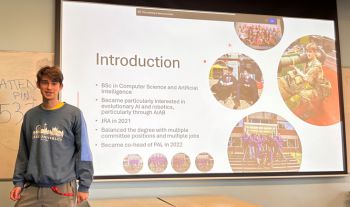News
Sussex AI Seminar Dexter Shepherd:: Complex Terrain Locomotion with a Focus on Tactile Sensing for Surface Grip
By: Aleks Kossowska
Last updated: Monday, 28 October 2024

Dexter Shepherd
Dexter delivered A Gripping Presentation: Complex Terrain Locomotion with a Focus on Tactile Sensing for Surface Grip.
Abstract:
Resilient locomotion across nature owes much of its success to tactile sensing. Being able to detect ground properties and adapt is key for robotic exploration of harsher terrains. Popular approaches to this in robotics make use of high-resolution optics. But to what extent is the high resolution useful? We manufactured high resolution sensors, and low-resolution vibration sensors to compare on the task of ground classification. Low resolution is cheaper and computationally less expensive, but what are the trade-offs? By classifying ground properties, a robot can adapt its gait to efficiently move across that texture. But before we can get to gait adaptation, there is much to be considered in sensor design, data collection and robustness investigations of models.
Bio:
Dexter Shepherd is a third year doctoral student in bio-inspired artificial intelligence with thebe.AIprogram. Dexter completed his undergraduate in Computer Science and Artificial Intelligence at the University of Sussex in 2022, and completed a Junior Research Asscociate in 2021. He then started his PhD within the area of tactile sensing with a focus on robotic feet and locomotion, with Phil Husbands, Andy Philippides and Chris Johnson as his supervisors. Within his time as a doctoral student he has ran the mentor scheme PAL (Peer assisted learning) which has won two Sussex education awards during his time in the team. He has been part of many outreach programs in local schools, as well as organising and teaching a data science and AI course in Malawi.
Watch the Sussex AI seminar on YouTube.